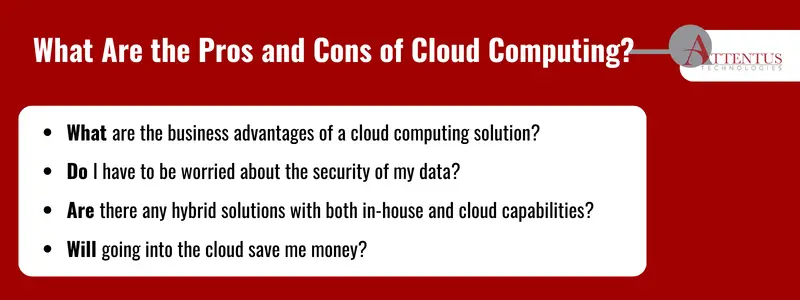Is a cloud computing solution right for your organization? Here’s what you need to know before you invest in the popular technology

Today, it’s common for businesses to put their heads in the clouds (so to speak), and statistics show that cloud adoption is exploding.
Worldwide public cloud end-user spending was projected to reach nearly $600 billion in 2023. Responding to the competitive economic environment, 41.4% of global tech and business leaders planned to increase their investment in cloud-based products and services.
Easy-to-access and use cloud-based storage and services are driving a digital transformation. Organizations use the technology to save money, increase efficiency, and enjoy other benefits. At the same time, they are contending with challenges that could include vulnerability to disrupted internet connections, human error, software compatibility issues, and more.
What Is Cloud Computing?
Cloud computing involves the on-demand delivery of computing resources—including hardware, storage, databases, networking, and software—through a network, typically the Internet. Organizations can store and access their information, applications, and analytics without managing their own devices or I.T. infrastructure.
Data can be stored remotely rather than locally on a proprietary storage device such as an in-house server. Workers in an organization can access their network wherever they have an internet connection.
Some of the cloud services typically offered include:
- Data storage, backup, and retrieval
- On-demand delivery of software
- Data analytics
- Audio and video streaming
The three principal types of cloud computing models are:
- Software-as-a-service (SaaS)
- Infrastructure-as-a-service (IaaS)
- Platform-as-a-service (PaaS).
The Pros of Cloud Computing
Numerous benefits come with cloud computing. One major benefit is its scalability and flexibility. The technology makes it easy to scale up resources and storage to meet rising business demands without investing in your physical infrastructure. You can also scale up and down to handle fluctuating workloads.
With a cloud service model tailored to your needs, you only have to pay for the resources you use, which can yield cost savings. Operational expenses, including I.T., may also be lower because the cloud provider manages much of the equipment and software, ranging from servers and networking gear to cloud storage.
Cloud computing facilitates collaboration and remote work, allowing workers to connect wherever they have an internet connection.
While security concerns sometimes linger around cloud computing, the reality is that cloud providers often invest heavily in robust security measures. This can be a significant advantage for businesses that may not have the resources to maintain a top-tier security infrastructure. Cloud providers benefit from economies of scale, allowing them to implement automatic security patching and updates across their entire platform. Additionally, centralized monitoring and management systems enable them to identify and address threats faster than traditional on-premise setups. Many cloud providers offer advanced security features like data encryption, intrusion detection, and access controls, providing multiple layers of protection for your valuable information.
The Cons of Cloud Computing
Before investing in cloud computing, it’s best to know both sides of the story. Because you need an internet connection to access your data and services, you can suffer a loss in productivity if the connection is unreliable or down for a long time.
While many people adopt cloud computing for its advanced security options, that’s not to say it doesn’t have any risks. Some security threats in cloud computing are misconfigurations that cause vulnerabilities, human error (the biggest source of data loss), and an insecure application programming interface (API).
Other cloud computing cons include:
- Vendor lock-in
- Integration challenges with an existing system
- Less control over the backend structure
Managing Cloud Computing Challenges
Most of the challenges posed by cloud computing can be met by doing your research and carefully evaluating what a CSP or MSP offers. When researching potential providers, look for the following:
- Services Offered: Ensure they provide comprehensive solutions, including strong cybersecurity protections.
- Packages and Pricing Models: Compare different packages and understand their pricing structures to find the best fit for your needs.
- Customer Support: Assess their customer support capabilities and response times.
- Reputation and Reviews: Look for reviews and testimonials from other businesses to gauge their reliability and performance.
Additionally, investing in a robust, dependable internet connection is wise to maximize your cloud services and ensure seamless operation. Educating yourself on these factors will help you make an informed decision and select a provider that best meets your business needs.
You can also hedge your bets by adopting a hybrid cloud solution, “a computing environment that combines an on-premises datacenter (also called a private cloud) with a public cloud, allowing data and applications to be shared between them.” This might particularly benefit some regulated industries that require certain types of data to be stored on-premises. Less sensitive data could be stored on the public cloud.
Making the Decision: Is Cloud Computing Right for Your Business?
Several factors come into play when deciding if cloud computing is the right choice for your organization. For example, if saving money is important, the cloud can give you access to the newest applications, programs, and tools you could not otherwise afford.
Or, if collaboration is essential to your work, cloud computing facilitates this by providing easy access to your network no matter where your employees work. Perhaps your business is growing rapidly, outpacing your infrastructure, posing storage issues and problems with sluggish applications. Cloud computing can easily scale services to your evolving needs.
Some companies in highly regulated industries are rightfully worried about data breaches. They must protect customers’ sensitive personal data and prevent successful cyberattacks from tarnishing their reputations.
In some cases, cloud computing may not be an appropriate solution. Defense contractors, for example, are prohibited from connecting to the public cloud. If you are an organization that wants total control over your computing environment, an in-house infrastructure might be the best bet.
So, if you do want to put your head in the clouds
If you’re considering embracing cloud computing, it’s crucial to weigh the advantages and disadvantages. Are adaptability, scalability, collaboration, and cost savings significant priorities for you? If so, then embracing cloud technology is the way to go. However, if you find in-house infrastructure more convenient and beneficial, you might want to postpone cloud adoption or explore a hybrid solution.
Be sure to find a CSP/MSP partner who values constant improvement as a core principle. As a proven managed services provider (MSP) and cloud services provider (CSP), Attentus is committed to continuous evolution, embodying our core value of “seeking constant improvement.” This dedication ensures we consistently strive for excellence in performance and service, keeping pace with the ever-changing landscape of cloud computing.
Our expertise in cloud solutions will make your working life easier and more productive by providing a solution tailored to your specific requirements.
Contact Attentus Technologies today for a free consultation. This could be your first step into the cloud.
